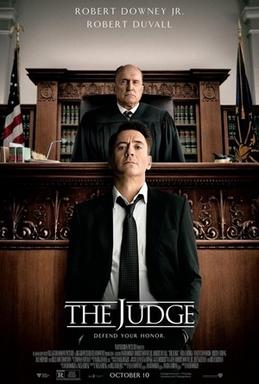For some of us, “home” and “family” evoke gooey nostalgia.
For others, they are catalysts for heavy drinking and therapy bills. Regardless
of our reaction, the idea that returning home can produce strong – and often
complex – emotions is one that registers with many people. While this built-in
pathos makes for an appealing premise for fiction and film, it is one that is
routinely mishandled.
The past year produced two such disappointments: The Judge and This Is Where I Leave You. Though they differ in tone, they begin
in almost the exact same way: a professionally successful younger son with a
troubled personal life is called back home following the death of a parent. In The Judge, it’s slick Chicago defense
attorney Hank Palmer (Robert Downey Jr.) who puts his divorce/custody battle on
hold to return to small-town Indiana to bury his mother; in This Is Where I Leave You, recently cuckolded
Judd Altman (Jason Bateman) comes home to bury his father. Of course, there is
tension with surviving family members: Hank is seen as a disappointment by his
ornery father (Robert Duvall), the town judge while Judd bristles at his sister’s
(Tina Fey) nosiness and his brother’s (Adam Driver) immaturity.
Truth be told, these set-ups work well enough to establish
character and conflict. It is how they play out that causes viewers to shake
their heads. Often times, family friction takes years to mend if it mends at
all. In these films, however, everything is one climactic argument or fight
away from being OK again.
Moreover, these movies take a rather uncharitable view of
those don’t put (emotional or physical) distance between themselves and family.
In both cases, there is a responsible older sibling who stayed close to home. The Judge’s Glen (Vincent D’Onofrio) is
treated as a broken-down former athlete rather than esteemed as a small business
owner while This Is Where I Leave You’s Paul,
who took over the family business, is shown to be a (possibly) impotent
killjoy. The protagonists’ former flames have it even worse: instead of getting
on with their lives, they are trapped in the thankless role of torch-bearer.
Not does this waste the talents of Vera Farminga and Rose Byrne (respectively),
it sends a clear message that if you don’t bolt for greener pastures, you must
be emotionally stunted and stuck in the past.
To be fair, both films have highs and lows that are
independent of the callow messaging and false narrative. The Judge is generally well-acted (by Downey and Duvall), but it’s
at least 20 minutes too long. This Is
Where I Leave You mixes amusing moments with tasteless and saccharine ones
and offers us one of the least Jewish Jewish families in recent memory. Both
films compare poorly to the previous year’s August:
Osage County, which took a similar premise and spared us the artificially tidy
wrap-up and hollow characterization.
The Judge: 7/10
This Is Where I Leave You: 6.5/10


No comments:
Post a Comment